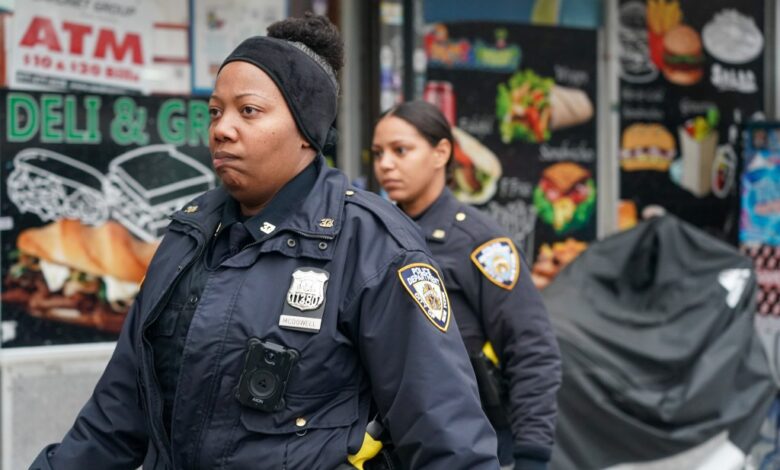NYC Council hates cops and just put yet another nail in the city’s coffin with ‘How Many Stops Act’

For New Yorkers confused about the battle between Mayor Adams and the City Council over a law requiring police officers to submit a record of virtually all public interactions, here’s your clarity:
The City Council hates cops.
Everything else is detail.
The council’s decision to override the mayor’s veto of the “How Many Stops Act” is yet another nail in the city’s coffin.
Not a single New Yorker will be made safer, nor will any form of justice be made fairer.
Those are the common-sense litmus tests for imposing added restrictions on police actions, and this law fails both.
The measure reflects only the anti-police bias of the reigning council majority, led by Speaker Adrienne Adams of Queens.
Hardly a moderate
She is supposedly a moderate Democrat, but I see no moderation in her claim that forcing cops to spend more time on paperwork will improve “the health and safety of our city and its neighborhoods.”
The idea would be laughable if the potential fallout wasn’t so serious.
In truth, it’s harassment based on an illogical mistrust and is designed to burden cops who do their jobs and intimidate others into being little more than blue flowerpots.
It’s not enough that cops are quitting in record numbers or that lawmakers and quisling prosecutors have effectively decriminalized thousands of offenses, including shoplifting, and dramatically cut jail populations.
The cop haters are from another planet in believing that police, not criminals, are the biggest problem in the city.
The public clearly disagrees.
Opinion polls consistently show vast majorities of New Yorkers put crime as their top concern, and the fear of becoming a victim is pervasive.
Although murders have declined, public disorder is rampant.
Forcing cops to provide detailed forms for every interaction, even innocuous ones, sends exactly the wrong message about what their priorities should be.
The Post’s interviews with residents and business owners in key districts reveal the disconnect from what the public wants to what the council wants. Crime victims, including at least three mothers who lost children in stray-bullet shootings, urged the council to shelve the bill in light of the mayor’s veto.
“I’m not sure if you have ever felt the pain that my family has in the aftermath of this unspeakable tragedy, but the thought of officers having to slow down or waste time filling out paperwork, while this individual is out there potentially committing more crime, makes me sick to my stomach,” wrote Eva Hendricks, whose 17-year-old son, Brendon Hendricks, was shot dead in The Bronx in June 2020.
Presumed guilty
Yet victims of crime have few friends in the council.
To most of the 51 members — 35 initially voted in favor of the bill and 42 voted to override the veto Tuesday — all cops are presumed guilty the moment they put on the uniform.
No other city worker is treated with such contempt, and yet the heroic men and women of the NYPD are what keeps Gotham from descending into pure hell.
To get locked up in the five boroughs, you already practically have to commit murder in front of a security camera.
So in what world does it make sense to put another hurdle in front of police?

The requirements of the measure reveal the agenda behind it.
The information cops must gather and report include the race, gender and age of the people they talk to, and whether force was used.
Proponents give away the game when they say the law would help curb abuses of stop-and-frisk policing.
So the whole agenda is born of a belief that police are dangerous, with suggestions of racism recklessly thrown around as some council members delivered revolting speeches Tuesday on why it’s necessary to protect the public from the police.
If mistrust is the standard, then let’s apply it to the council.
It’s safe to say more New Yorkers trust the police to do the right and honest thing than they do the City Council.
Wouldn’t it be fair play if the public demanded a written report on whom every council member talked to each day and about what?
And it would be poetic justice if they also had to wear body cameras.
One indication of the public’s feeling of the current gaggle of clowns is the extremely low voter turnout in the election that put them in office.
According to data collected by Citizens Union, even some highly competitive races last year were decided by turnouts of registered voters that were as low as 13% and 14%.
Heart in right place?
The result is a legislative body that reflects only the will of a sliver of the electorate.
And that sliver is dominated by activists who have played an outsized role in forcing New York into a hard-left turn.
Their radical ideology reduces every issue to race, class and gender, and shatters any sense of civic cohesion.
You can bet the pro-Hamas rabble disrupting the city with their antisemitism protests are also firmly behind the council majority’s attacks on cops.
And anyone who thinks the same radicals — in and out of office — won’t be back for more restrictions on the police isn’t paying attention.
Unfortunately, Mayor Adams, as usual, played his hand with a maddening inconsistency and ineffectiveness.
Although he opposed the bill, he was objecting to only one aspect of it.
As he said himself in an interview with 1010 WINS radio Tuesday, “I think conceptually, the City Council’s heart was in the right place.”
He also said, “I agree with the concept of the bill. It’s just the Level 1 interactions that I am troubled about.”
He was referring to interactions in which the police have stopped people for credible reasons, but have not detained them.
Officers in such encounters can ask non-accusatory questions such as “Where are you going?” and can request identification, but the civilian involved is free to leave.
Adams says he still hopes that aspect can be negotiated away before the law takes effect, but has no objection to it being applied to increasingly serious police stops defined as levels 2, 3 and 4.
And so it goes in New York, where even the cops’ boss and defender doesn’t fully have their backs.
Look out below.
‘Retaliation’ an empty promise
Count David Rabinovitz as skeptical about President Biden’s response to the killing of three American soldiers in Jordan.
He writes: “Because Iran and its proxies have so many weapons stocked all over the region, it will take some time until Biden, Secretary of Defense Austin and Secretary of State Blinken can find an empty warehouse to attack.”
Vile loss of support
Reader Paula Tanny asks the gazillion-dollar question, writing: “Many of Donald Trump’s policies were sound and beneficial. The problem is his personality — it’s childish, impulsive and classless.”
“Many people have a hard time voting for him because of the vile insults he directs at people. Why doesn’t he understand this?”




